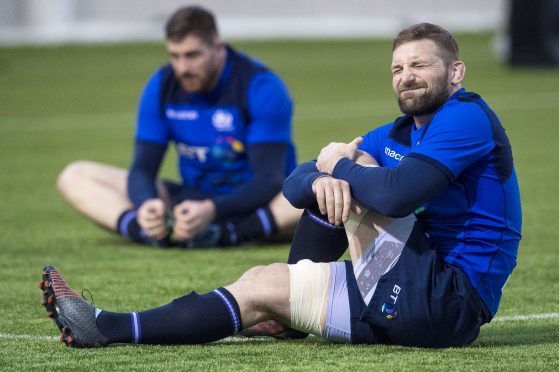Time was – only about decade ago in fact – we’d be glad to be thrilled to be just competing with the Wallabies. Now defeat to them at Murrayfield this afternoon would actually amount to complete failure.
Between 1982 and the remarkable 2009 game, when the atmosphere at Murrayfield was possibly as close as it’s come to Saturday’s epic against the All Blacks, Australia won 15 successive times against Scotland, never scoring less than 27 points.
Since the 2009 game, where the rearguard action to end them all eked out a 9-8 win – and only because Matt Giteau squaffed a routine conversion at the death – it’s been honours even at three wins all, and there’s never been less than a score in it.
Scotland won for the second time in succession on Australian soil this summer, a win in Sydney that ranks among the best achieved by any team in a dark blue jersey. But not beating the Wallabies again today in the final Autumn Test at BT Murrayfield, in the wake of last week’s All Black game, will be an example of the Scots flattering to deceive yet again.
It was true after Sydney, as Scotland lost to Fiji the week after thereby putting a dampener on what could have been a huge kick start to the Gregor Townsend era. Another let-down in the wake of an outstanding performance – albeit in defeat – cannot be tolerated this week.
Captain John Barclay has played in all three of the Scots wins – he’s lost to the Wallabies just once – and he knows it “always comes down to the wire”.
“There are fine margins in all the games now,” he said. “The game here (a year ago) was a 78th minute try for them.
“Over there we had a penalty and they managed to turn the ball over in the 78th minute and we turned it back over in the 79th minute.” The Rugby World Cup quarter-final of 2015, which Barclay missed, goes without saying, of course.
“It’s exciting for fans and players alike,” he continued. “They are very physical games, very fast games and we have been closely matched.”
Barclay doesn’t concur with the prevailing attitude that Australia have improved since the Sydney game in June, saying he thought they were pretty good even then.
“I found it bizarre that people were saying they were on a downslope,” he said. “They had been in the World Cup final two years before and they play against the best teams in the world every few weeks, so it’s not exactly that they’re playing against pub teams.
“They have some of the best players in the world. I disagree with people saying they were in decline. They have always been one of the best teams, and it’s maybe just the nature of the beast that they will always be under pressure from the media.”
For Scotland, the skipper continued, there’s a realisation that this match is something of an acid test, but a confidence that they can kick on from last week’s furious finish.
“We know that if we play well then we can compete against the best teams in the world and put ourselves in positions to win games,” he said. “We played the best team for the past 10/15 years last weekend and it came down to the last play of the game.
“That has to be encouraging and an indication of where our mindset is at.”
Australia arrive at Murrayfield perhaps, like New Zealand, a little weary at the end of their long season. There’s a definite point to former All Black captain Jeff Wilson’s comments this week that neither the Northern Hemisphere nor Southern Hemisphere sides see the best of each other when they meet in their respective domestic international windows.
The Wallabies have made a strong recovery from the trauma of their loss to the Scots and being 54-6 down at one point in the first Bledisloe Cup match in Sydney, at least until England pulled away from them in the last 10 minutes last week.
The view – publicly agreed from the Scottish camp – that the Wallabies were hard done by at Twickenham doesn’t really survive close examination. In truth the number of yellow cards shown to Australians illustrated the pressure they were put under, and Eddie Jones’ “finishers” duly finished them off.
The Wallabies’ captain Michael Hooper saw his eighth yellow card in that game – the most by anyone in test matches and an illustration of how he plays on the edge. Barclay is cut from the same cloth, although he hasn’t been sanctioned – or maybe caught – as often as his opposite number.
“He’s a talismanic figure for them and he’s playing well,” said the skipper. “He’s disruptive at the breakdown, he’s fantastic with ball in hand, so their back row is definitely an area of strength..
“He plays on the edge. You could argue that Richie McCaw should have had a few more in his career, but that’s just the way he plays the game.
“The refs want the breakdowns to be very clean now. They want clean ball, fast and entertaining games, so I guess that’s the challenge for opensides and for back-rowers because it’s still a big aspect of the game, how do we slow it down legally.”
Hooper versus Barclay will be one the keystones of today’s game, but there are plenty elsewhere; Bernard Foley against Finn Russell, Kurtley Beale and Stuart Hogg, the massive Wallaby centres and Scotland’s recast midfield, the duel between Australia’s impressive ball carrying No 8 Sean McMahon and the Scots assigned to stop him, Hamish Watson and Ryan Wilson.
But for Scotland, despite the many battles with injuries this autumn, if they are good enough to be one looped pass away from beating New Zealand, they should be plenty good enough to beat Australia. Nothing less will do today.
